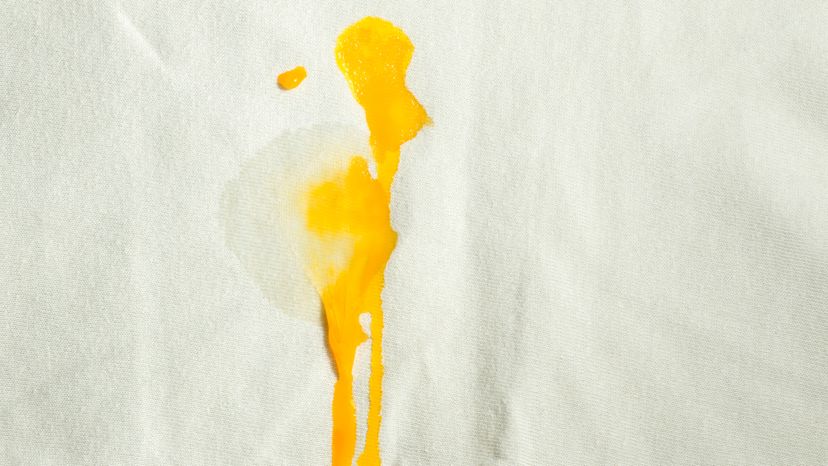
Are your brains scrambled over what to do when breakfast gets out of hand? Use the following stain removal methods to get rid of sticky egg stains.
Advertisement

Are your brains scrambled over what to do when breakfast gets out of hand? Use the following stain removal methods to get rid of sticky egg stains.
Advertisement
Acetate, Burlap, Carpet/Synthetic, Carpet/Wool,
Fiberglass, Rayon, Rope Silk, Triacetate, Wool
Advertisement
Remove the excess material, then sponge with a dry-cleaning solvent, K2r Spot Lifter (except on acetate blends) or Afta Cleaning Fluid. Then apply a dry spotter to the stain and cover with an absorbent pad dampened with dry spotter. Let it stand as long as any stain is being removed. Change the pad as it picks up the stain. Keep the pad and stain moist with the dry spotter. Flush (the method of applying stain remover to loosen staining materials and residue from stain removers) with one of the liquid dry-cleaning solvents. If any stain remains, use an enzyme presoak (follow directions on label; caution, some enzyme presoaks are not designed for use on wool). Cover with a clean pad that has been dipped in the solution and wrung almost dry. Let it stand 30 minutes. Add more solution if needed to keep the area warm and moist, but do not allow the wet area to spread. When no more stain is being lifted, flush with water.
Remove Egg Stains From:
Acrylic Fabric, Cotton, Linen, Modacrylic, Nylon,
Olefin, Polyester, Spandex
Scrape (the method of using a scraping tool to gently lift off excess solid or caked-on stains) to remove the excess and sponge (the method of using light strokes with a dampened pad working outward from the center of the stain) the stain with a dry-cleaning solvent, K2r Spot Lifter or Afta Cleaning Fluid. Then apply a dry spotter to the stain and cover with an absorbent pad dampened with dry spotter. Let it stand as long as any stain is being removed. Change the pad as it picks up the stain. Keep both stain and pad moist with dry spotter. Flush with one of the liquid dry-cleaning solvents. If any stain persists, apply a few drops of dishwashing detergent and a few drops of ammonia to the stain, then tamp or scrape. Keep the stain moist with the detergent and ammonia and blot occasionally with an absorbent pad. Flush well with water to remove all ammonia. Allow to dry. If stain still remains, use an enzyme presoak (follow directions on label). Cover with a clean pad that has been dipped in the solution and wrung almost dry. Let it stand 30 minutes. Add more solution if needed to keep the area warm and moist, but do not allow the wet area to spread. When no more stain is being lifted, thoroughly flush the area with water.
Remove Egg Stains From:
Acrylic Plastic, Alabaster, Aluminum, Asphalt Bamboo, Brass Bronze,C ane, Ceramic, Glass/Tile, Copper, Cork, Enamel, Glass, Gold, lron, lvory, Jade, Linoleum, Marble, Paint/Flat, Paint/Gloss, Pewter, Plexiglas,Polyurethane, Porcelain Dishes,
Porcelain Fixtures, Stainless Steel, Tin,
Vinyl Clothing, Vinyl Tile, Vinyl Wallcovering
Scrape up any excess egg with a dull knife. Wipe the area with a cloth or sponge dipped in warm sudsy water. Rinse well and wipe dry.
Advertisement
Bluestone, Brick, Concrete, Flagstone, Granite, Limestone,
Masonry Tile, Sandstone, Slate, Terrazzo
Advertisement
Wipe up the excess. Wash with a solution of washing soda or detergent (never soap) and water. Use a cloth or soft-bristled brush. Rinse thoroughly with clear water and allow to air dry.
Felt Fur/Natural, Fur/Synthetic
Very gently scrape the excess material from the surface. Mix dishwashing detergent in hot water and swish to make a great volume of suds. Dip a cloth in only the foam and apply. Wipe with a clean dry cloth. If a grease stain remains, powder the area with an absorbent such as corn-meal. Give it plenty of time to work, then gently brush (the method of using a stiff-bristled brush to gently remove dried stains and spots) it out. Repeat if necessary. Using a damp cloth, gently remove any remaining powder.
Advertisement
Grout
Wipe up the excess with a cloth dipped in warm sudsy water. If any stain remains, dip a wet toothbrush into a little powdered cleanser and gently scrub the spot. Rinse well with clear water and wipe dry.
Advertisement
Leather, Suede
Very gently scrape the excess egg. Mix a solution of mild soap in lukewarm water. Swish to create a great volume of suds. Apply only the foam with a sponge. Dry with a clean cloth. If a grease stain remains, powder the area with an absorbent such as corn-meal, allowing enough time for it to work. Gently brush it off and repeat if necessary. On leather only, follow with Tannery Vintage Leather Cleaner & Conditioner or Fiebing's Saddle Soap to condition the leather.
Advertisement
Silver
Remove any excess spill. Wash as soon as possible in hot sudsy water. Rinse in hot water and dry immediately with a soft cloth to prevent tarnish.
Advertisement
Wallpaper
Carefully wipe up the excess. With a cloth or sponge moistened with cool clear water, wipe the area. Overlap strokes to prevent streaking. Gently pat dry.
Advertisement
Wood
Mix dishwashing detergent in hot water and swish to make a great volume of suds. Dip a cloth in only the foam and wipe off egg residue. Rinse with a clean cloth moistened with clear water. Polish or wax as soon as possible.
Advertisement
The next time you have a bad start to your day during breakfast, take these cleanup methods to heart.
©Publications International, Ltd.
Advertisement
Please copy/paste the following text to properly cite this HowStuffWorks.com article:
Advertisement